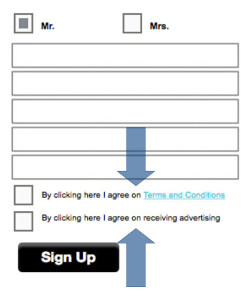 I came upon this agreement (for using a public wifi service) at the airport a couple of days ago. They ask for me to “agree on terms” and “agree on receiving ads”.
I came upon this agreement (for using a public wifi service) at the airport a couple of days ago. They ask for me to “agree on terms” and “agree on receiving ads”.
This one is kind of tricky, because it almost seems right. We can certainly “agree on it”. And we can “agree on terms”. But I think we should really “agree TO terms and conditions”, and “agree TO receive advertising”.
I have to admit that I’m not sure where the distinction comes from. Scratching my head a bit, I think you agree TO things than might be a bit disagreeable (like junk mail or getting up early for a meeting), but you agree ON things that you are OK with, but just need to make more precise (like meeting at one time rather than another).







